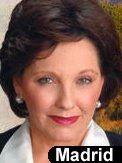The head of the N.M. Foundation for Open Government claims AG King has been more aggressive than his predecessor in enforcing sunshine laws. Here’s why he’s wrong.
I was surprised this week to see Leonard DeLayo, executive director of the N.M. Foundation for Open Government, quoted in an article as saying that current state Attorney General Gary King is a stronger believer in the state’s sunshine laws than his predecessor, Patricia Madrid.
But that’s exactly what he said:
“I think the King administration is a lot more aggressive than the Madrid administration was in dealing with matters,” DeLayo was quoted by the Santa Fe Reporter as saying. “Gary does seem to believe in (the Inspection of Public Records and Open Meetings acts) far more than Patsy did…”
 While I think it’s difficult to say either believes in the sunshine laws more than the other, I certainly disagree with the assertion that King has been “more aggressive” than Madrid “in dealing with matters.” It’s simply not true.
While I think it’s difficult to say either believes in the sunshine laws more than the other, I certainly disagree with the assertion that King has been “more aggressive” than Madrid “in dealing with matters.” It’s simply not true.
DeLayo’s comments were included in an article about the “mixed reviews” King gets on his handling of complaints of violations of sunshine laws. What’s clear from the article is that King has been intentional, when complaints are filed, about issuing opinions on whether violations occurred, and he’s eased public access by putting at least some of those opinions on his Web site.
What King hasn’t ever done, though he has determined that some government agencies have violated sunshine laws, is take the aggressive step of prosecuting those who operate in the dark.
The public records act includes no criminal penalty, so there is no criminal charge to file. But a violation of the open meetings act is a misdemeanor punishable by a fine of up to $500 per offense.
While King has not prosecuted violators of the open meetings act during his tenure, Madrid is one of two attorneys general in the state’s history who did just that. As I’ve written before, in 2002 Madrid filed charges against five members of the Las Cruces Public Schools Board of Education for violating the act.
All five board members were convicted and fined for secretly giving the former superintendent almost $1 million in incentives over the course of several years to try to keep him in Las Cruces.
A lasting and widespread impact
Though Madrid’s office conducted occasional seminars on compliance with sunshine laws, it’s fair to say that King has devoted more time and energy to seminars and other ways to educate elected officials about compliance with the laws. But Madrid did what King has not, at least to this point — backed up her words with action. She was the first AG since the 1970s to do it.
I know from personal experience that the criminal charges had a lasting and widespread impact. For starters, the Las Cruces school district became and has remained much more careful about complying with sunshine laws.
And in 2003, while working at The Santa Fe New Mexican, I discovered another example of the impact of the school board case.
I had come across and was reporting on some open meetings act violations committed by the board of a water and sanitation district located outside Santa Fe. In the course of my reporting, I had a conversation with the president of the board in which he asked where I had come from and what work I had previously done. When I told him I had reported on the Las Cruces schools, his eyes widened and he said, “Oh, you’re that guy.”
He went on to tell me that he had heard about my reporting on the school board violations and how it helped lead to the AG investigation and criminal case against the board members. He said local government elected officials from around the state were aware of that case and more cautious about complying with the open meetings act because of it.
His was a case in which better training on compliance with the act would have made all the difference.
It’s important to focus on education. The vast majority of local elected officials throughout the state need only to understand how to comply with sunshine laws in order to do it. But there will always be a small number who intentionally hide from the public in an attempt to get away with shenanigans. It happens all the time. Some are doing it right now, right under King’s nose.
Madrid is one of two attorneys general in this state’s history who has taken on such wrongdoing. To say that King has been more aggressive and believes more in the state’s sunshine laws than Madrid is simply false.

